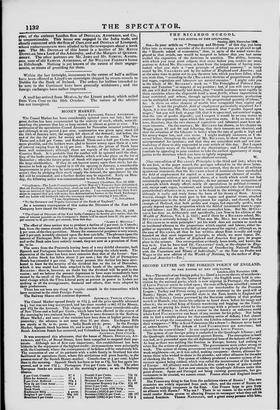THE RICARDO SCHOOL.
TO THE EDITOR OF THE SPECTATOR.
Sunday, 20th November 18311.
Sza—In your article on " Prosperity and Distress ' of this day, you have fallen into so strange a mistake of the doctrines of what you are pbased to call the " Ricardo school of economists' " that, in spite of the sonnd views dis- played in that article, one would be tempted to believe that you had nevem studied the exposition of the doctrines in question. The ability, however, with which you treat most subjects that come before you, render., me more anxious to defend Mr. RICA RDO, at least from the imputation of having over- looked what you style a " new principle of political economy," as lately stated by Dr. CHALMERS and by the author of England and America ; and at the same time to point out to you the error into which you have fallen, when you state that, "according to the (RicAano) doctrine of proportionate profits and wages, capitalists and labourers are natural enemies." I might refer you to the whole of Mr. RICARDO'S work on " The Principles of Political Eco- nomy and Taxation " in support of niy position ; but, if you will turn to page 63, you will find it distinctly laid down,that "wealth increases most rapidly m those countries where the disposable land is most fertile, where importation is least restricted, and where, through agricultural improvements, production can be multiplied without any increase in the proportional quantity of labour' " &c. Is there no other element of wealth here recognized than capital and labour? Is not the profitable field of employment particularly stipulated far? Again, it is true that Mr. RICA RDO has asserted, that " profits depend upon wagea ;" but you will find, at page 159, that it is upon real, not nominal wages, that the rate of profits depends ; and 1 suspect it would be no easy matter to overturn the arguments upon which this assertion rests. It by no means fol- lows, therefore, that the two classes of capitalists and labourers must have ad- verse interests. On the contrary, Mr RICA RDO has shown, in his chapter on Wages, pages 97 and 93 and tullowing, that their interests are identical, and that the situation of the labourer is better when the rate of profit is high and his money wages low, and vice versa. I might multiply instances, as I ob- served before, throughout the works of Mr. RICA RDO, to show that you have misrepresented his opinions ; and that they are coincident with and not con- tradictory of those so ably expounded in your article of this day. But I expect you are already weary of the length of my observations ; and I shall therefore conclude by appealing to your candour to take the earliest opportunity of doing justice to the doctrines which you have so lightly impugned.
I am, Sir, your obedient servant, W.
[Our own edition of RICA uno's Principles is the third and last ; where we do not find, at the pages named, the passages referred to in the above letter. Assuming, however, that the quotations are correct, they do not at all militate against our statement, that the RICA RDO school of economists have overlooked the field of employment for capital as a most important element of wealth. Such incidental notices as are quoted above, of a truth which could not but occasionally present itself to any inquirer, do not amount to the recognition of a principle which deeply affects nearly all speculatious in political economy; and, except such vague, occasional, and merely incidental (we had almost said parenthetical) allusions to it, none is to be found in the writings of RICA RDO, although it really and truly forms the basis of his theory of Rent. ADAM SMITH, though for the most part in but vague and general terms, attached great importance to the field of employment for capital ; and showed, by the example of Holland, that both profits and wages but especially profits, must greatly depend upon the proportion which the field investment bears to capi- tal and labour ; and Mr. R /CA R DO did not contradict him. But Mr. APCuLs LOCII has done so, deliberately and specifically, (see Note in his edition of the Wealth of Nations Vol. I. p. 152); and if there be a RICARDO school, Mr. APCuLLocu certainly belongs it. What was Mr. MILL but a close follower of RICARDO as to main principles ? yet his work does not contain so much as an incidental allusion to the proportions which capital and labour, either to- gether or separately, bear to the field of employment for capital ; although as, its the case of RICA RDO, all that he has written about Rent is really and truly founded on that most important princie, to which, we must repeat, Dr. CHALMERS and the author of England and America first gave its proper place in the science. Our correspondent evidently loves truth, and knows the way to it. Can he have read Dr. CHARMERS' work, or the chapter in Eng- land and America on the " Coincidence of Overflowing National Wealth with the Uneasiness and Misery of Individuals," or the Note on Profits and Wages in the new edition of the Wealth of Nations, by the author of Eng- land and America ?—.En.]


























 Previous page
Previous page